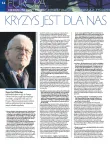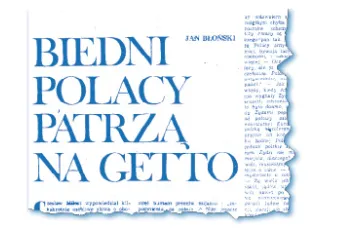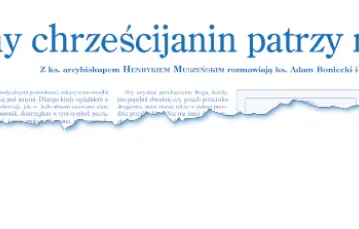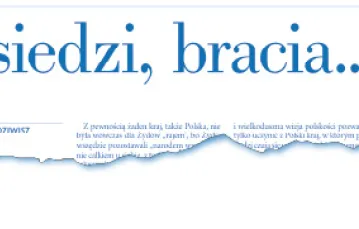Wykupienie dostępu pozwoli Ci czytać artykuły wysokiej jakości i wspierać niezależne dziennikarstwo w wymagających dla wydawców czasach. Rośnij z nami! Pełna oferta →
How did it happen that religion-Christian religion but recently also Islam-became such a serious trouble in the very process of shaping of Europe?
I really do not know. I remember the days of ‘Solidarność’ in Poland, when people struggled for liberty, for democracy, and for Europe. Pope John Paul II said that Europe has Christian roots and these roots-together with Greek, Hebrew and Roman roots as well-have always been renewed in the history of Europe. It’s not just the fact that in the Middle Ages we were Christians. It is the fact that without Christian witness the fall of communism without bloodshed could have never been accomplished. And he wanted to incorporate the Christian roots in the European Constitution as a specific contribution to the people who had fought with the terror that communism brought to Europe.
It was a discovery of new pragmacy of Truth against power. Totalitarian rule always says: “Power makes truth." And there was the answer: “No, Truth can resist power and Truth is the only possibility of resisting power." And this truth was not incorporated in our Constitution, and a Constitution with no roots was repealed by the European societies. And then, the opposition to the idea of Europe has been growing throughout Europe.
Why was that so?
I think that one good reason was that this Europe has no face. How can you love Europe that has no face? So I wonder if the problem is religion towards Europe, or rather that we Europeans do not love Europe any more. Why should we love it, when it is just a system for making money, one against the other? If we want to be brothers, we must have a father. At a certain point in the hymn of the European Union by Schiller we sing (probably not aware of what we do): “Brüder über’m Sternenzelt / Muss ein lieber Vater wohnen"-“Brothers, beyond the Stared Vault of the Sky / There must be a loving Father." Otherwise, how could we be brothers? Why should we, Europeans, be closer to one another than to other peoples, to Chinese for instance, if not because we have common cultural roots.
And I am worried not only for the Christian roots, I am worried for the ideas of Socrates, which are equally important to us. The Greek-Roman tradition, with the primacy and obedience of Truth, saw freedom as the result of the discovery to Truth. And it seems now that we do not want to be free in this way but freedom is reduced to the liberation of instincts. Yet, this liberation does not build either the community of the family, or the community of the nation.
Europe seems now to be a peculiar exception on the religious map of the world. We witness the modernization in Africa, Latin America or Asia which does not result in any fall of religiousness. On the contrary-the interest in religion increases there. And it is still quite vital in the USA. So what is wrong with Europe that it is so much subject to secularization?
The problem is not religion, it is Europe. Shall we see the doom of Europe? Shall we see the sunset of the European civilization while other people will be trying to lay their hands on leadership in Europe tomorrow? People who have strong religion ties? Because religion is growing in the world. The world itself is growing. And Europe is not. Demographically and economically Europe is becoming smaller and smaller. When religion dies also the driving force of civilization perishes.
Your country, Italy, is still, I believe, not so much a place where religiousness decreases? At the end of 20th century there was even some kind of a renaissance of religiousness…
This is the sign of hope. Very often in history-and I shall not say this only of Italy-it seemed that Christianity had come to an end and was bound to disappear. And every time there came great saints, and they had been a kind of a new starting point. When in the 13th century St. Francis was active, one of his first biographers, Thomas von Celano, called him “Alter Christus"-“Another Jesus." And Saint Francis made it possible to experience the creative force of Jesus the Lord, and the Church flourished again. The same happened in the 6th century with St. Benedict. And perhaps some day somebody will say: “Well, the same happened to Europe with John Paul II." History is full of surprises.
I see there is an old Christianity that died away, and there is a new Christianity that is growing. People who become Christians find in this religion an answer to the problem of modernity. We used to think that Christianity was a problem and modernity was a solution. Many young people today think quite the opposite way. I belonged to the generation of people who were not labeled Christians and who discovered Christianity as an answer-modern Christians. To me Christianity was an answer to my human problem. And lots of young people today start to take this path…
But it happens more frequently outside Europe. You can see much more of them in Latin America, in the USA.
I am not worried for the future of Christianity-I am worried for the future of Europe. Because it might be that Europe is bound to fall.
One of the older Polish bishops used to say: Christianity will survive all historical disasters, but it may be not Christianity in Poland or even in Europe…
The problem is whether Poland and Europe will survive. Very frankly speaking, if we follow the present demographic trends, we will disappear. Within few centuries people will speak of the Europeans in the same way we speak of Assyrians: “They were. They had a mighty empire… ." “When was it?." “I don’t know… ."
ii
Sociologists dealing with contemporary religiousness tend
to see-as a prognostic of a crisis-a separation of two
complementary aspects of religiousness: faith and participation.
But what seems philosophically disturbing is that some of them (Daniele Harvieu-Leger among them) point at the recession
of faith, while some others (as Grace Davie)-on the contrary-
at the recession of participation. Are we, Europeans, “believing
non-belongers" or rather “belonging non-believers"?
Faith generates belonging. Faith is a tale of discovery. I happened to discover, to meet, my father and my mother. I was lost, I was an orphan, and then I discovered them. Faith was the discovery of my mother and father, and then I belonged to them. How could I have faith without belonging?
Our faith, our belief in the father, generates community. You and I, we both belong to Jesus Christ. We both discover as our true identity the identification with Him, and we are more united than man and wife. So how can we have faith without belonging?
Can you have belonging without faith? Yes, you can. You may belong to a community, to the sociological structure, without being animated by intimate fire. But it is not completely true-because one would say: belonging generates faith. Take Pascal-act as if God existed and you will soon feel that He is there.
When I was a very young child, I did not feel very religious. I have never seen the Virgin, I did not speak with saints, but there was a group of young men-they were the kind of men I wanted to be. They were friends. And they told me: “Well, we pray. Will you start to pray as we do?" And I said: “Yes, why not?." I did not understand what was the use of it, but they said that it was important for humanity, for the way you were. I said: “Yes, I will do." And I still do. I came to this through this small community.
When Janusz Korczak asked his orphans why they pray,
he received a list of answers that made him astonished. There was not a one purely ‘religious’ reason. Instead children
explained: “I pray, because we all pray," “Because praying
makes me less scared," “Praying gives better life"…
I have never believed in pure religion. Christianity is not a pure religion. It is human, it is life. Religion is always mixed with all other aspects of life. And I am ready to admit that this mixture is not always a good one. We all know the turpitudes of Christians that have arisen from the bad mixture of faith with worldly elements. But the faith needs to exist in flesh-this is the logic of incarnation. And that created the Church. Someone said, that the Church is like a great river that carries pure water and also unpure water. When there is flood, it may also carry dead animal corpses. This is the Church. But in the end the pure water will wash out all of this mud. At least in the end.
Charles Taylor claims that what the Church mistakenly demands,
is that the faithful would approach their God only on usual, tradi
tional paths. Is it a Christian obligation to seek for new itineraries?
That is true. We are a kind of nomadic people. The Church, as a pastoral, is designed on the territory. The very idea of a parish comes from Greek para-oikos, near-to-home. It is very important that the Church becomes near to every group of people by coming near their homes.
It was perfect when all the people who were important to me lived within five kilometers from my home. Now I am back to Italy for some time, but a few years ago my best
friends, people who were the most important to me, whose
judgement was influential on my life, lived scattered on two
continents, half a dozen of countries and we were sepa
rated by a distance of hundreds or thousands of kilometers.
How does the Church become close to us? Here in Rome
there were some priests who complained: “Young people do not come to our parish churches." And others replied: “Then we have to go to the places where these people go to, we have to go to Piazza Navona." We are somehow nomadic. John Paul II realized that very well. He saw the role of pilgrimage, he went as a pilgrim and made an appointment with young people: “Let’s meet in Santiago, let us meet in
Częstochowa," and they got together there.
Maybe then the Church should also look for new language
itineraries? Do you think that young citizens of Europe’s
biggest cities at the beginning of the 21st century will recognize
themselves in the narrative of sheep and their shepherds?
Church has to listen to the mass of the people. If it does not, it is lost. The fundamental question of human kind stays the same-it is not so that people changed that much. Yes, we have a natural leaning to live on the surface of things, and this leaning is supported by the powerful industry of the media. But in the end you must come to grips with yourself-when you fall in love, when you have a child, when you go to work, when you die or your beloved person dies. And the Church must be there. God acts in mysterious ways, even through the errors that nomadic people do. And I think it is a very difficult point for the Church. On one hand, we have to be absolutely open, on the other hand, we have to be absolutely firm in telling right from wrong. And humble: not pretending to be better than anybody else. I can tell you that you are wrong but I know that I am not necessarily better that you. God has given me the grace of telling right from wrong. Very often in Church we are more Pharisees than Christians saying: “I’m good and you are bad." And when I happen to see that you are wrong I take the occasion to make you feel humiliated by my superiority. This is the offence to human dignity and something that young people cannot stand.
You know I had some problems with what I said about homosexuality. Which is wrong. But this does not mean that I am better. There are many ways of being a sinner, that is not my way, but maybe mine is worse that that. I will always remember my great friend who was a Christian homosexual and he said: “Rocco, you are a sinner too, and most likely a worse sinner than I am." I said: “Of course, you are right. I might argue on that “most likely," but you are certainly right."
It is difficult to accept this reality-you need to speak without mercy. True love very often requires that I tell you the unpleasant truth. If I cannot tell you the unpleasant truth, I am not really your friend.
iii
Thinkers like Gianni Vattimo or Richard Rorty insist that
the future of religion depends on to what extent the Church
would allow religion to pass into private dimension… So that it
relies more on our personal freedom…
Good point. What is freedom?
At this point it is nothing more than depending on your own decisions…
Too bad. I belong to myself. And it is terrible. Try to think about it that way. A man who really belongs to himself is a very unfortunate guy. Like a man who says that his dog is his best friend. It is very inadequate.
The man who lives the full life is the man who belongs, who belongs to love. That is the secret of Christianity. To be in love, to be married, is better that being alone. And freedom… This is seen very well by Charles Péguy: what is the purpose of freedom, what is the use of freedom? To be given, as a gift, in order to built the community. Without freedom I cannot make myself the gift for others. The sense of love is making yourself the gift for others. A man who belongs to his wife, to his children, to his parents, to his brothers and sisters, to the Church, to a party, to a community, to a nation, is much happier and more truly a man. Of course you must know the real freedom. We live in the world that is full of lonely, solitary people-and they are not free…
And the task of education is to develop in young people the inner drive so that they can learn the true freedom, what is the use of freedom in order to build communities. And the first community is family. So we must help young people to fall in love, to love, to have children. If we shall not do that, Europe will disappear.
How can one teach that?
One of very important things is teaching young males to watch women. Yes, this belongs to the nature of men. I am very grateful to a friend of mine, he is a priest (strange enough that priests can teach young male how to look at women! But they can!). He told me: “You must first look at the head and the heart, and then at the rest, which is still important…"
Sex is like water. If it is safe, it is very positive-per accident it is very bad, because you can drown in water if you cannot swim good enough. So you must teach young people to swim.
If this is the task of the Church, I doubt very much that this is done well enough…
The Church, yes, but also the family! I met once a great psychoanalist, Jacques Lacan, and he said something I will never forget: “The child sees his mother with the eyes of his father." He learns to watch women the way his mother was present in the eyes of his father.
I went through the papers this morning. There is an old and good friend of mine, Angelo Scola, the Cardinal of Milano, and he said something similar today: he will never forget the way in which his father looked at his mother after 55 years of marriage. Of course, if you do not have that example, you may find a different one in the course of your life, but this first impression of your parents-it is always the best one.
Let us go back to the question of truth. There are many opinions today that the best solution for the modern-day religion is to give up the struggle for Truth and start the struggle for Good. Christianity has to resign the ambition to speak on behalf of the human kind (on behalf of the Objective Truth) and satisfy itself just to speak from the depth of positive revelation.
Everybody wants to be loved. But would anybody be happy when loved untruly? If we have the question of true love, we must consider the question of truth first. “Look" a girl says to another “He is good to me, he loves me." “Truly?" No one is willing to build up his life on what is not true.
A different thing it is to say: Truth is grater than us. Truth does not belong to me-I belong to it. We must be very careful not to pretend that Truth belongs to us, not to make of Truth an instrument for ourselves. And we should never forget that nothing can substitute another being in the encounter of Truth. Each and every one has its own path towards Truth. We can help each other to a certain extent but I cannot impose my Truth on you. Not because my Truth is not true, but because you have to discover Truth through your own life-path, which is different than mine. There is one Truth, but different paths lead to it.
Now, the idea that you can live without Truth is false. It is like saying “Let us act as if… ." Let us act as if I was a woman. But I am not, I never was, I do not have an experience of the female body, I shall never become pregnant, I shall never have the experience of giving birth-is it not better that I come to grips with my experience, with my male body, that God has given me instead of acting “as if" I were someone else?
They say that it happened for the first time in the last decades
of the 20th century that the older generation failed to pass on
their beliefs to the younger generation (which is certainly an
important step towards secularization)…
I think-to a large extent-the true religion has declined in the 19th century and even more in the 20th century as it was substituted by the religion of the state, the religion of the nation, the religion of the social class. And we believed in these religions, we have given our lives to these religions, and we have committed terrible crimes because of these religions. We killed because of these religions. And then they broke down. What were these values that the older generation had to pass to the younger one?
If we have enough courage to say: we are sinners, and we have to go back to the Truth we have abandoned. When it comes to the period of revolt against older generation, which is physiological, which is good, instead of having the older generation saying: “The things in my life, the things I lived through, are true. I give you my witness of it" the younger generation saw the olders to be unsure of what was the tradition they should pass to their children. There were also good values, vital values, but intermingled with those which were not organized, because there was a secular breakdown of the system of values.
Secularism did not appear yesterday-it was the second war. It was not a religious one, but rather atheistic. Wars are made in the name of power. Often I find the kind of criticism against the Church that says: “There were wars led in the name of God." Yes, there were such wars, and they were terrible, they were bad, and they were a long time ago. The wars led in the name of man are our yesterday, and they were much worse.
Rocco Buttiglione (1948), italian christian democrat politician and an academic. he is a professor of political science at saint pius V university in rome, and a member of the pontifical academy of social sciences. he served as a minister for EU policies in silvio berlusconi’s government from 2001 to 2006. in 2005 buttiglione received an honorary doctoral degree for his commitment to the ideas of liberty. his nomination for a post as European commissioner with a portfolio that was to include civil liberties, resulted in controversy as some political groups opposed him for his roman catholic views on homosexuality, despite his assurances that these were only his personal convictions and would not dictate his administration.







